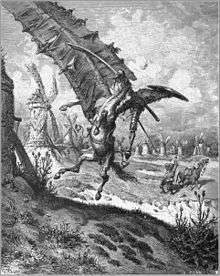Tilting at windmills

Tilting at windmills is an English idiom which means attacking imaginary enemies. The word "tilt", in this context, comes from jousting.
The phrase is sometimes used to describe confrontations where adversaries are incorrectly perceived, or courses of action that are based on misinterpreted or misapplied heroic, romantic, or idealistic justifications. It may also connote an importune, unfounded, and vain effort against adversaries real or imagined for a vain goal.[1]
Etymology
The phrase derives from an episode in the novel Don Quixote by Miguel de Cervantes,[1] wherein protagonist Don Quixote fights windmills that he imagines are giants. A relevant portion of the novel states:
Just then they came in sight of thirty or forty windmills that rise from that plain. And no sooner did Don Quixote see them that he said to his squire, "Fortune is guiding our affairs better than we ourselves could have wished. Do you see over yonder, friend Sancho, thirty or forty hulking giants? I intend to do battle with them and slay them. With their spoils we shall begin to be rich for this is a righteous war and the removal of so foul a brood from off the face of the earth is a service God will bless.""What giants?" asked Sancho Panza.
"Those you see over there," replied his master, "with their long arms. Some of them have arms well nigh two leagues in length."
"Take care, sir," cried Sancho. "Those over there are not giants but windmills. Those things that seem to be their arms are sails which, when they are whirled around by the wind, turn the millstone."
— Part 1, Chapter VIII. Of the valourous Don Quixote's success in the dreadful and never before imagined Adventure of the Windmills, with other events worthy of happy record.
Historical context
Cervantes wrote Don Quixote in two parts, published respectively in 1605 and 1615, during the latter part of a historical period known as the Spanish Golden Age. During this age, Spain pursued military conquests in parts of Europe and conquered large parts of the Americas, which brought great riches to the country and inspired a flowering of the arts. In La Mancha, Castilla, there are still some of the old windmills that Don Quixote found in his adventures.
Cervantes wrote and published Don Quixote during the Eighty Years' War, or Dutch War of Independence (1568–1648), a revolt by the Habsburg Netherlands to end Spanish rule. In Don Quixote, the eponymous protagonist consistently misinterprets his own, his adversaries', and his allies' actions and motives — regularly resulting in apparently unjustified violent actions and consequences. One way of interpreting Don Quixote's tilting at windmills could be as an allegory to promote critical, skeptical, or satirical evaluation of either a hero's motives, rationales and actions, or a nation's foreign policies.
Popular culture
Films
The movie They Might Be Giants (1971) features a reference to Don Quixote thinking that the windmills are giants, and the movie is named after that reference.
Music
The band They Might Be Giants took their name from the eponymous 1971 film. It is theorised that their song that also bears this name (from the album Flood) discusses Quixotic attitudes.[2]
The hardcore punk band Dead Kennedys references Don Quixote in their song "Rambozo the Clown", from the album Bedtime for Democracy. The song compares Don Quixote's delusional assault on the windmills to right-wing advocation of the Vietnam war.[3]
Canadian singer-songwriter Gordon Lightfoot, in a 1972 album release by the same name, wrote and recorded the song Don Quixote which contained the lines "through the woodland, through the valley, comes a horseman wild and free; tilting at the windmills passing, who can the brave young horseman be...".
See also
References
| Look up Tilt at windmills in Wiktionary, the free dictionary. |
- 1 2 Ammer, Christine (September 13, 2003). What does "tilt at windmills" mean?. The American Heritage® Dictionary of Idioms. Boston, Massachusetts: Houghton Mifflin Harcourt. ISBN 0618249532. Retrieved May 31, 2013. ISBN 978-0618249534
- ↑ "Interpretations:They Might Be Giants (Song)".
- ↑ "Dead Kennedys – Rambozo The Clown". Retrieved June 21, 2013.